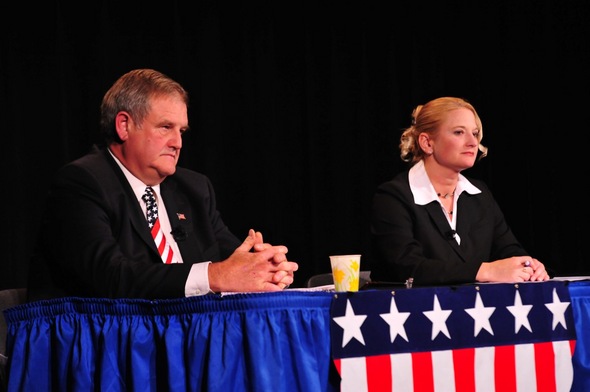Warren and Hochstetler discuss Pure Michigan, tax breaks and education funding in Senate debate

Republican John Hochstetler and Democrat Rebekah Warren discussed a myriad of issues during the 18th District state Senate candidate debate hosted Wednesday night by the League of Women Voters of the Ann Arbor Area.
Ryan J. Stanton | AnnArbor.com
Democrat Rebekah Warren and Republican John Hochstetler agreed on one thing Wednesday night: It's a shame to see cuts to the Pure Michigan tourism campaign.
The Pure Michigan promotional budget for this year is about $17 million, down from $28 million in 2009. Last year, the ad campaign was responsible for bringing in 2 million out-of-state travelers who spent $600 million, according to Travel Michigan.
In fact, for every dollar Michigan spends on the campaign, it brings back an estimated $2.23 in state tax revenue, according to state officials.
"A three-to-one return on your investment — but we cut it down to almost nothing," Hochstetler said Wednesday night, chalking it up as another of the state's many blunders.
"The program has less funding than we'd like it to have in the upcoming year as we struggle to keep things rolling in Lansing," Warren agreed. "But it's an important program, and I'll keep fighting to find funding for it because tourism is an important part of our economy in Michigan."
Hochstetler, a farmer from Manchester, and Warren, who currently represents Ann Arbor and the 53rd District in the state House, faced off Wednesday night in a debate hosted by the League of Women Voters of the Ann Arbor Area.
The two candidates — survivors of their respective primary battles from August — are seeking the open 18th District state Senate seat in the Nov. 2 general election.

Rebekah Warren
Warren, who is heavily favored to win, made clear her intentions Wednesday night to continue pushing for reform of what she considers an "antiquated tax system" in Michigan.
"One of the biggest challenges that we are facing in Lansing is, for one too many budget cycles, we've actually been filling the holes in our budget with one-time funding sources that get us through a year but don't do anything about the structural deficit that the state has been facing," she said. "So I'm an advocate of real tax reform. We need to take a look comprehensively at our tax system, and actually bring it into the 21st Century."
Warren favors a graduated income tax. She said Michigan still relies too heavily on property taxes and is one of only a handful of states that still has a flat income tax.
She also said the state's gas tax isn't cutting it, and she wants to change the funding formula so roads and bridges can get fixed and other transportation-related improvements can happen.
Hochstetler's general message was taxes are too high, and he'd like to see them lowered. As far as addressing the state's crumbling transportation infrastructure, he said, perhaps lowering the weight limits on state highways is one way to go.
"We have one of the highest weight limits on our trucks in the nation," he said, suggesting that "massive semis" with heavy loads are tearing up the state's roads.
Warren has served in the state House since 2007. She said Michigan has faced tough times as the state's economy has diverged from the manufacturing industry, and it's especially important now to educate students for the jobs of tomorrow.
"I'm proud to say, after four years of serving in the Legislature in tough economic times, I never voted one time to cut funding for education — not at K-12 level, not at community college level, or in the public universities," she said. "We have to invest in our children. That is our future."
Warren said the state's public universities have seen dramatic decreases in state funding. In the 1970s, she said, public universities in Michigan received 70 percent of their revenue from the state and 30 percent from fees and tuition.
"Now that's almost completely on its head, which means our students and their families are struggling," she said. "And we have a group of our kids that are being priced out of being able to attend our public universities, and that's just wrong."
Hochstetler said he has trouble with the fact that there are K-12 school superintendents making more than $300,000 a year, while teachers pay for classroom supplies out of their own pockets.

John Hochstetler
"I think it's terrible the way we've treated our kids, our teachers and our school system in this state," he said, though he's not sure more money for education is the answer.
"Let's look for a minute at truth and reality," he said. "In the Ann Arbor school system, we have 66 people making over $100,000 a year."
Hochstetler criticized Michigan's film incentive program, which allows filmmakers to get up to a 42 percent rebate for production expenses that occur in the state.
"We're spending $100 million and we're getting $10 million back," he said. "Is there any wonder we're in a deficit?"
A recent report by the Senate Fiscal Agency has fueled growing concerns about the value of the film incentive program. The report shows the subsidies generate about 10 cents in new tax revenue for each dollar paid to filmmakers.
In 2009, the state spent $68.7 million on film tax credits but generated only $7.5 million in tax revenue from film production activity, leaving the state with a net loss of $61.2 million.
Warren didn't directly address the topic of the film incentive on Wednesday, but spoke generally about tax abatements and tax credits.
"An important thing to keep in mind is that tax abatements or tax credits are just one tool in our economic development toolbox that we can use, and sometimes it can be a very appropriate tool," she said. "But like anything, it's something that we have to use cautiously and that we have to review and see if it's effective."
Warren said one of the concerns she has about tax abatements is the state is "basically giving away revenue" that local communities need for services like police and fire.
"And we do that on the promise that a company is going to provide certain jobs," she said. "What happens often is that those jobs aren't provided, and there is no penalty. So I'm a big proponent of what we call 'clawback' provisions — if a company gets a tax abatement on the promise of creating a certain number of jobs, and they fail to come through with that number of jobs in the community, they should be held responsible and pay back that tax credit."
Hochstetler said Michigan has too many burdensome regulations on businesses, and taxes are too high. He called the Michigan Business Tax a "suicide tax" that's killing businesses.
"We need to get rid of it and do it real quickly," he said.
Warren said her priorities in Lansing have been fighting for quality education, job creation and economic development, and protecting the state's natural resources. She said she has a record of working on those issues through successful bipartisan efforts.
As examples, she noted the passage of the Great Lakes Compact to prevent water diversions from the Great Lakes and other efforts to protect the state's wetlands.
As he did in the primary, Hochstetler continued Wednesday night to advocate for 10 Percent Washtenaw, a program that aims to raise awareness of the benefits of buying locally grown food. He pointed out county residents spend more than $1 billion a year on food, and they're sending almost all of those dollars outside of Michigan.
If 10 percent of the people in Washtenaw County would commit to buying locally grown food, he said, that would equate to a $100 million a year business.
Hochstetler said he also would work to ban genetically modified foods.
"No one else is talking about it," he said. "Why is it Europe will not allow genetically modified food, but that's all we have? Think about it. Do you want to live?"
Ryan J. Stanton covers government and politics for AnnArbor.com. Reach him at ryanstanton@annarbor.com or 734-623-2529.


Comments
Franka
Fri, Oct 29, 2010 : 10:34 p.m.
Trespass, Anybody that is pro GM/GE/Transgenic organisms has either NOT done their homework/research or has nefarious goals and motives. The research showing how dangerous GMOs are is there and the results are not good. Doesnt matter what is combined; its the messing with that produces the problem. And that claim of itll solve the worlds food problem? Itll solve it by means of reducing the worlds population by reducing fertility and causing cancer. Bottom line: follow the money.
Jennifer Shikes Haines
Fri, Oct 8, 2010 : 6:59 a.m.
Trespass - I'm not sure where you're getting your information but anti-GMO is definitely not anti-science. Here are some articles that might enlighten you as to the dangers of GMO crops: http://www.nytimes.com/2010/08/24/world/europe/24modify.html?_r=1&ref=genetically_modified_food The Week, a politically balanced news digest, discusses the controversies behind genetically modified foods frequently. Recent articles have included "'Frankenfish': It's What's For Dinner" and "Meet the Enviropig" - non-subscribers can't access articles here. http://www.washingtonpost.com/wp-dyn/content/article/2010/09/18/AR2010091803520_2.html?sid=ST2010091804108 Here are the precepts of the Slow Food movement: http://www.slowfoodusa.org/index.php/slow_food/good_clean_fair/ I could go on and on. Being against GMO crops in no way is anti-science, nor does it have anything to do with anti-Evolution textbooks. You may not agree with Mr. Hochstetler's views in various areas, but you can't attack a pro-environmental stance as being anti-science.
Milton Shift
Thu, Oct 7, 2010 : 8:41 p.m.
All they ever talk about is how to give more money to rich business owners. Taxes are too high. We need more tax breaks for industries. Let's give the rich more money while the rest of us have to suffer through austerity? At least they're honest and open enough to make it clear they're NOT on our side!
trespass
Thu, Oct 7, 2010 : 11:40 a.m.
"Hochstetler said he also would work to ban genetically modified foods" These genetic modification allow us to use fewer pesticides, give higher yields and require less (illegal) farm labor. Label it if you want but we don't need to have an anti-science senator. Next thing you know he will want to ban evolution from our science textbooks.
Marvin Face
Thu, Oct 7, 2010 : 10:31 a.m.
In order to understand how good the Pure Michigan ads are/were, one only has to witness the absolute garbage ads now on television promoting(?) tourism in Washington DC. I actually have to turn them off, they are so offensive to the senses. I really like DC but these adds make me hate the image they are portraying.
Stephen Landes
Thu, Oct 7, 2010 : 10:04 a.m.
The "Pure Michigan" ads have been remarkably effective. The film credits have been remarkably expensive for a very small return. Let's take $11 million from the film credit program and use it to fully fund "Pure Michigan".
Forest City
Thu, Oct 7, 2010 : 9:44 a.m.
Pure Michigan benefits the entire state of Michigan, from Battle Creek to the Keewenaw Peninsula in the UP that has tourists. And tourism was rebounding nicely this summer.
sbbuilder
Thu, Oct 7, 2010 : 8:47 a.m.
Our state is falling apart, not because of an 'antiquated' tax structure, but because we have no more people to collect 'antiquated' taxes from. You can't squeeze blood from a turnip; nor can you squeeze any more money from the populace of the state of Michigan. Increased taxes are self defeating, and this is nothing more that increasing taxes, otherwise Lansing wouldn't be interested.
Ignatz
Thu, Oct 7, 2010 : 8:27 a.m.
I appluad Ms. Warren for wanting to upgrade our tax structure. I'm tired of seeing my state fall apart.
Top Cat
Thu, Oct 7, 2010 : 8:26 a.m.
"Warren favors a graduated income tax." Warren would love to eliminate one of the few competitive advantages Michigan has so she has more money to feed to the tax consumers and public unions that she is beholden to. One more reason to vote NO on the constitutional convention.
PittsfieldTwp
Thu, Oct 7, 2010 : 7:57 a.m.
I miss the Pure Michigan ads this fall. What I don't understand is if we have sophisticated enough marketing analytics to calculate such a return, then we should be able to fund the campaign from the beneficiaries. In other words, if we know we are making money, then we know who is getting the money. This is a principle reason why ad spenders demand an ROI. Pony up.
Elaine F. Owsley
Thu, Oct 7, 2010 : 7:37 a.m.
Let's invite Meijer Gardens and other tourist sites like Greenfield Village or The Ford and the hotels on Mackinaw Island to contribute to the cost of producing Pure Michigan. Their individual share would be a pittance compared to the benefit they receive from this really fine publicity campaign.